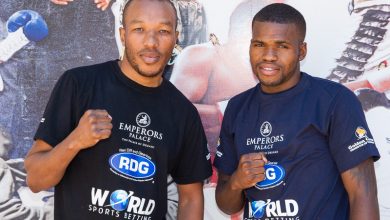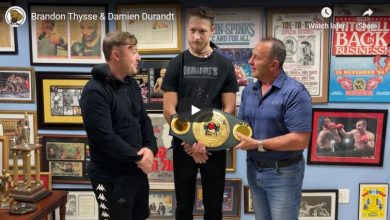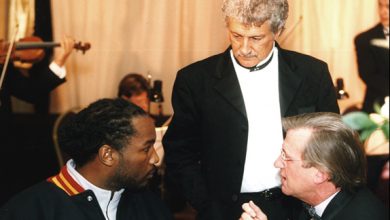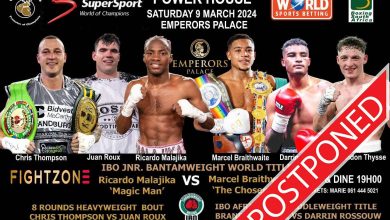Behind the mic: a chat with boxing’s best voice
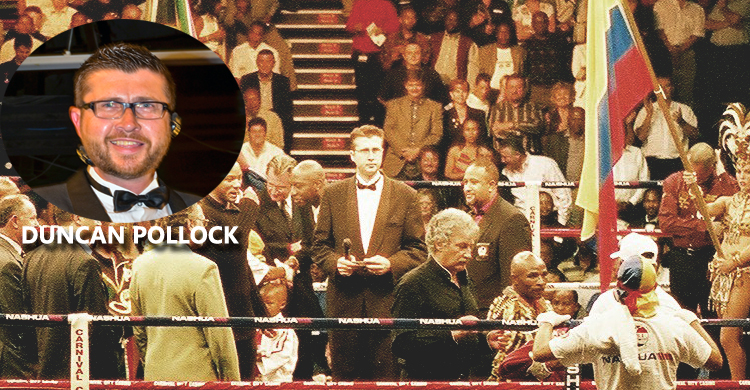
A voice like velvet, a presence that commands attention. With a deep, resonant tone that cuts through the roar of the crowd, DUNCAN POLLOCK is a master of his craft. More than just a voice, he embodies professionalism. A gentleman of the ring, he adds a touch of class and sophistication to every fight. Golden Gloves gets the lowdown . . .
How long have you worked with Golden Gloves as a boxing MC?
I think my first announcing job for Golden Gloves was in early 1998. I don’t recall the exact date, but it was a mid-week tournament in the Cheyenne Saloon at the Carousel in Hammanskraal. A great venue that was only about 10 people deep (around the ring), but with four levels, it afforded spectators a great ringside experience; they were never really more than eight or 12m from the ring.
How did you get into the industry?
I was employed by Sun International, at The Carousel in April 1996, as the on-site promotions and events MC (I’d been involved in radio and MC work since my days at TuksFM as a student); and as a result, was part of the marketing team that assisted Golden Gloves in physically presenting events at both the Cheyenne Saloon and the big outdoor marquee that also hosted music concerts, themed functions like an Oktoberfest, as well as exhibitions.
Having had to set up and label seating for Rodney Berman’s events, assist with dressing rooms, and act as an usher, as an employee of the host venue I was obviously exposed to the event itself, as well as all the behind-the-scenes goings-on. At the time (coincidentally) an ex-colleague of mine from a radio station called Sold GoldFM, Dennis Dovale, was doing announcing for Supersport, and I literally thought ‘I’m here anyway, why shouldn’t I be doing this?’. So, I had a chat to my manager Karen Rothschild who then introduced me to the late Shona McTaggert who in turn came and had a listen to me doing ‘my thing’ on the casino floor. Shona liked what I did, and subsequently organised an audition for me with Boxing South Africa (I think it was at the Wembley Arena in Turffontein). I subsequently received my ring announcer license, and rather fortuitously, maybe two or three weeks later, Dennis was unable to work at ‘that’ fight night at the Cheyenne Saloon in June 1998, and I got offered the chance.
What are the qualities most required to be an elite-level MC?
‘Elite-level MC’ – I like that, ha ha.
Seriously though, I think like with any responsibility one has, taking pride in what you do is paramount. If you have that, you will never allow yourself not to do your best.
I see what I do as a kind of behind-the-scenes job’ My responsibility is to make each boxer shine, and to get the crowd to appreciate the athlete in front of them. If I get those two things right the boxer stands proud when that opening bell rings, and those watching can’t wait to see ‘the best man win’. When it all comes together, it really is electrifying – it’s like two race horses waiting for the starting gate to open, and when it does each and every spectator runs that race with their favourite.
With the time and effort fighters put in to compete at the top level, and the price fans pay to see that action first hand, they deserve a great performance from all involved, and that includes me, no matter how small my role is in those preparations for what could be 12 rounds of life-changing championship boxing.
Who are the boxing MC’s you grew up admiring?
To be honest, I was never a boxing fan. Growing up in the 80s and 90s I did get up early for the odd fight, but you could probably count that on two hands, and I remember watching local fights on Sunday afternoons on Topsport too, but don’t ask me who was fighting. That said, I do remember quite vividly, as a young boy in Pretoria, the massive hype around the Gerrie Coetzee-John Tate WBA title fight at Loftus – the whole city was covered in fight posters, and I remember the attendance was insane too. That said, I was a keen (although not so talented) sportsman at school so (local) names like Charlie Weir, Tap Tap Makhathini, Brian Mitchell, Sugarboy Malinga, Pierre Fourie, Dingaan Thobela, Johnny Du Plooy, Welcome Ncita, Kallie Knoetze, and Baby Jake were not lost on me.
The above said, in respect of your question, and this only really ‘happened’ after I received my initial license in 1998 and started doing some homework as to how to do this ring announcing thing, the benchmark for anyone, in my view, can only be Michael Buffer. Granted, his ‘Let’s Get Ready to Rumble’ and amazing voice has made him known the world over, but he still just gets the job done – he’s eloquent, respectful, well presented, always on point, never stumbles over his words, and owns the ring, but never tries to steal the limelight, ever. I have always liked that.
What have been the highlights through the years?
Two things stand out: Announcing the Lewis vs Rahman heavyweight unification bout at Carnival City in Brakpan in 2001 for HBO; and announcing Hekkie Budler’s first WBA mini flyweight title defence against Pigmy Kokietgym in the totally ‘over the top’ Salle Médecin at the Casino de Monte Carlo in Monaco.
Two very different locations, I know: Brakpan and Monte Carlo, but perhaps that’s the very reason, along with the obvious fact that the Rahman/Lewis contest was for the heavyweight championship of the world, at ‘home’ in South Africa, and watched across the planet by the planet.
I think something else that stands out, and maybe it’s just me getting nostalgic as I get older, is the opportunity to do what I do. Everyone always says ‘what?’ when I tell them I do ring-announcing, and that is immediately followed by: ‘How did you get into that?’ and the answer is always as I explained above, but with the addition of ‘luck’ and ‘right place and right time’.
Very few people get to do what I do; I mean, just the experience is cool: not only ringside at title fights, but in the ring with the fighters, anthems playing, crowds singing and chanting, national flags over my right and left shoulder, it’s really something to experience. It’s hard to put into words, suffice to say, once the anthems are done, announcements are made, crowds are going wild, and I step out of the ring leaving behind just the two fighters and the referee, I feel proud, privileged, and blessed – and I get paid to do it. I don’t think there’s a word that can describe all of that.
Any clangers or embarrassing moments?
The only real ‘moment’ I can recall was at the end of Harry Simon’s challenge for ‘Winky’ Wright’s WBO junior middleweight title in the Carousel marquee in August 1998. I’d only been announcing for a couple of months, and this was a seriously close contest going back and forth until (in my view and the crowds) Harry swung it in his favour during the 9th and then left nothing in his tank in the final round.
When I was handed the scorecards, it read a majority draw with two judges scoring it even and the other in favour of the challenger – Winky retained his title; there was mayhem, and I remember hearing (via my earpiece) Gary Murray, who was commentating at the time with Nick Collis, saying ‘I think the announcer has it wrong.’ My first reaction was: ‘what have I done?’
Luckily, judge Julie Lederman realised straight away that her score had been tallied incorrectly and should have read 115-113, and not 114-114. The change was made, Harry was brought back to the ring, and re-announced the new WBO, and Namibia’s first, world champion by majority decision. All’s well that ends well.
Who are your favourite fighters, and why?
Favourite fighters? That is a tough question. Guys like Roberto Duran, Marvin Hagler, Lehlohonolo Ledwaba, and Brian Mitchell come to mind, but maybe it’s because of that fight at Carnival City in April 2001, and the fact that he won back his undisputed title later that year defeating Rahman a round earlier than when he had knocked him out in Brakpan, but ‘The Pugilist Specialist’ will always be my favourite. Well spoken, not super flamboyant, but a master at using his height, reach and size, and an undisputed champion who retired at the top, and avenged every loss he ever suffered. Lennox Lewis gets my vote.
How long did it take you to settle into your particular style?
I’m not sure I have a style, unless just keeping things clean, neat, and tidy is a style. I always do my best to get fighters names correct and make an effort to always go to each and every dressing room before the event starts to check that – it’s the least one can do, it shows respect. When a fighter has a nice long list of accolades I always try and build momentum when going through those as I introduce them, I guess that’s kind of my thing, and again talks to respecting these athletes and heaping praise and recognition where its due.
In terms of settling into things: as you learn and gain experience in anything that you do, habits form, confidence grows, and you become better at identifying and mitigating against possible stumbling blocks, and if you’re lucky you’re able to either jump over them, or swerve passed them all together. As the saying goes: ‘fail to prepare, or prepare to fail’ – like a good boy scout I always try to ‘Be Prepared’.
What does your research/homework entail?
I kind of have a routine, and I guess that talks to the habits I mentioned just now. In fact, if the run-up to the opening bell doesn’t go quite like this, I feel quite off kilter. I normally receive the running order straight after the final weigh-in, the day before the fight. I usually spend the night before, or the morning of, writing out my cue cards as best as possible. Then once the ‘skeleton’ is done, I research each fighter, try and read a few pre-fight news articles, and interrogate BoxRec to check records, titles, places of birth etc. I also have a pile of old cue cards (yes, I know I should have these saved digitally somewhere, but who has the time?) that I also take with me everywhere as a further reference.
I then receive the ‘Announcer Sheet’ from Boxing South Africa, normally in the late morning on the day of the fight where I transfer weights, trunk colours, as well as all the officials’ info onto my cue cards – referencing my old ones again to get residence details of international judges, if I’ve worked with them before. I then double check everything, the running order of bouts, number of rounds per fight, weight divisions, officials, and make notes of sponsors, any dignitaries who may be called into the ring, as well as reminders of when/if anthems will be played. I then have an afternoon nap, shower, get dressed and try and get to the venue around an hour-and-a-half before we start.
Once at the venue I go and say hi to the SuperSport guys in the Outside Broadcast van, collect an access wristband, and then head into the dressing rooms where I run through all the relevant details I have with each fighter. I always check name pronunciations, and also re-check trunk colours and confirm monikers. I then head to the venue and confirm all fight officials with the supervisor. Once I’m happy that I have ‘everything’ I head back to the SuperSport van to make sure the info they have, and will show on screen, matches what I have. I then head back into the venue, get my earpiece sorted and handed my mic – and we’re good to go!
As an aside, I recently came across a cue card that had Kevin Lerena at 2–0. How old is that? Unfortunately, or maybe not if you ask my wife, I haven’t kept every one of them. Perhaps if I had Jeff Ellis might buy them off me and add them to his memorabilia collection.
Do you have a day job?
I do. I got into ring announcing as a staff member at the Carousel, and I’ve been in the gaming industry ever since. After working for Sun International for almost 12 years, we moved to Cape Town in 2008 where I worked for Grand Parade Investments in the Limited Payout Machine sector for seven years. I then spent some time in Business Development at a contract electronic manufacturing plant in Retreat, before joining my current employer DR Gaming Technology (DRGT™) as the Head of Marketing. I left DRGT™ for about a year in 2022 to work for Peermont as the General Manager of their online sports betting business, and re-joined DRGT™ in June last year as Managing Director: Africa.
I also freelance as a radio presenter on Smile 90.4FM and have done similar weekend presenting work on Jacaranda FM and Magic828am. I also spent a year or so writing and reading weekend sports news on Cape Talk and Kfm.
Has pressure or stage fright ever been a factor?
I only really experience pressure when I am unprepared, and I do my best to make sure that doesn’t happen; as a result, when the odd curve ball does get pitched (and one must remember I’m all alone in there, front and centre for all to see) it is easier to bat away.
Regarding stage fright – no. But I do always have some nerves ahead of that initial crossing to me, however, once that first ‘link’ is done and it comes out OK, muscle memory kicks in and we do it all again . . . to the best of our ability, and as if it’s the last one we’ll ever get the privilege to do.
About Duncan Pollock
In addition to hosting local and international boxing events as a ring-announcer, Duncan also currently works as a freelance radio presenter on Smile 90.4FM in Cape Town, having previously worked as the weekend radio host on the station from late 2021 to mid-2023, as well as on Jacaranda FM between 2006 and 2008. He also hosted a weekend midday radio programme for 4 years on Magic 828am and has also written and read sports news on both Cape Talk and Kfm.
Duncan does have a Monday to Friday ‘day’ job: he is the Managing Director of DRGT Africa (Pty) Ltd, the local subsidiary of Belgian casino management system and jackpot technology developer and supplier DR Gaming Technology. In addition to being responsible for the direction and growth of the company’s African business endeavours out of Johannesburg, he has a dual marketing role too, which together with his MD responsibilities, has seen him travel to places like Las Vegas (obviously), London, Barcelona, Macau, Dublin, Lima, Tallin, Sydney, Brussels, Prague, Vienna, and Mexico City. Duncan works from home in Cape Town every alternate week to being in Johannesburg or overseas.
He has been married to Nell-Louise, an embroidery artist, since 1999, their son Rees was born in Polokwane in 2004; Rees is currently studying for a BCom at Varsity College in Newlands.

